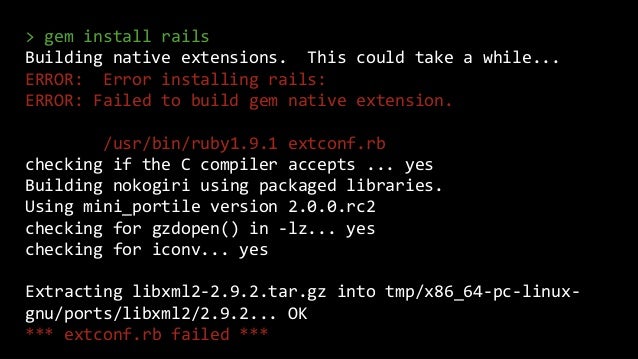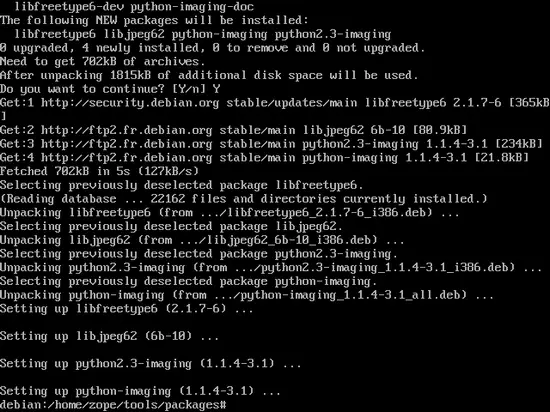- Zlib Is Missing Necessary For Building Libxml2 Macos 10
- Zlib Is Missing Necessary For Building Libxml2
- Zlib Is Missing
- Nokogiri Zlib Is Missing Necessary For Building Libxml2
- Zlib Is Missing Necessary For Building Libxml2 Macos Free
- Zlib Is Missing Necessary For Building Libxml2 Macos 3
- Zlib Is Missing Necessary For Building Libxml2 Macos 7
If I enter./configure into MSYS then everything works but it can't find zlib and says zlib is not installed. There must be some pre-requisites for libpng to be set up for building with zlib but I'm not sure how to find out what they are? I've just had this same problem on a fresh Ubuntu 14.04 box and it turns out there is a dependency for the zlib source (i.e. Zlib.h) so you need to: On Ubuntu or Debian: sudo apt-get install zlib1g-dev On Fedora, CentOS or RHEL: sudo yum install zlib-devel Or find the equivalent package for your operating system.

Nokogiri includes its own updated and patched copies of libxml2 andlibxslt libraries. By default, installation of Nokogiri will usethese copies. Alternatively, you may install using your operating system'sbuilt-in libraries or other custom versions of these libraries.
This document also helps with common problems we've heard. If you have anissue not discussed here, pleaseopen an issue.
For earlier versions of Nokogiri, find instructions inthe git history for this document.
For other platforms, please send pull requests to sparklemotion/nokogiri.org-tutorials.
- On Tiger ppc, zlib doesn't build i386 support for the dylib. Configure spits out: - Configuring zlib for architecture i386 Checking for shared library support.
- The easiest possible cause of a 'missing' zlib.dll file is that you've mistakenly deleted it. If you suspect that you've accidentally deleted zlib.dll but you've already emptied the Recycle Bin, you may be able to recover zlib.dll with a free file recovery program.
Install with included libraries (RECOMMENDED)¶
Ubuntu / Debian¶
Install Nokogiri on a brand new Ubuntu system with these commands:
Note for RVM users: you may require libgmp, consider running sudo apt-get install libgmp-dev.
FreeBSD / OpenBSD >= 6.2¶
Zlib Is Missing Necessary For Building Libxml2 Macos 10
Install Nokogiri on a brand new FreeBSD system with these commands:
OpenBSD < 6.2¶
Use gcc from ports in order to compile the included libraries:

Windows¶
Precompiled Gems¶
If you're using RubyInstaller to install Ruby, then you can install Nokogiri's pre-compiled gem to avoid having to install a compiler toolchain:
Note that gem will download and use a version of the gem appropriate for your system and architecture (e.g., x64-mingw32, x86-mingw32, etc.).
Compiling From Source¶
Nokogiri source gems can also be compiled and installed using RubyInstaller plus Devkit. This might be necessary if the binary gem doesn't work with your ruby version. (However, if a brand new Ruby version has just come out, give the maintainers a week or so to cut a compatible version of the gem!)
Install Nokogiri by compiling the vendored libxml/libxslt libraries:
Alternatively, install Nokogiri by linking to MSYS2 system libraries:
Fedora, Red Hat, and CentOS¶
Install Nokogiri on a brand new Fedora, Red Hat, or CentOS system with these commands:
Zlib Is Missing Necessary For Building Libxml2
Alternatively, you may install the appropriate epel-release and get theNokogiri package from EPEL using:
GNU Guix¶
Install on any Linux distribution using GNU Guix,a reproducible binary software package management and distribution system.
Use this command:
Note: source code is available here. A short description of how Nokogiri was packaged can be foundhere.
Ruby on Alpine Linux (Docker)¶
The official ruby-alpine Docker images arestripped of their development tools to minimize size. To install nokogiri (orother gems with native extensions) you'll need to install build tools again viathe build-base meta-package(which includes gcc and other necessities).
TermUX¶
Although TermUX isn't fully supported right now, some people have reported success getting Nokogiri installed on it by running these commands:
Zlib Is Missing
macOS¶
First, make sure you have the latest version of RubyGems and xcode commandline tools:
Agree to the Xcode license:
Then install nokogiri:
This is verified working on maxOS 10.9 w/ Xcode's clang compiler. (Many thanks to @allaire and others for helping!)
xcode-select errors with a 'network problem'¶
If, you see this dialog when you run the above commands:
Then run this command to turn off forced-authentication with Apple SoftwareUpdate:
Nokogiri Zlib Is Missing Necessary For Building Libxml2
Error Message About Undeclared Identifier LZMA_OK¶
A more recent error mentions an undeclared identifier LZMA_OK:
The solution for this is a little more subtle and can be fixed in a couple ofways.
When using Homebrew, there are several libraries that use a formula called
xz(includingthe_silver_searcherandimagemagick), which by default install a version ofliblzmathat is incompatible with most Ruby builds. (Homebrew installs only the 64-bit version of the library, but most Ruby builds are universal.) This can be fixed in a couple of ways:a. The most reliable way appears to be temporarily unlinking
xzand relinking it during an install ofnokogiri:b. The third way is to use a Homebrew-installed
libxml2, as suggested in using your system libraries.
Unable to find libraries on macOS Mojave¶
Xcode 10 on macOS Mojave moves the system headers out of /usr/includeand so Nokogiri will fail to build. Instead you'll see an error similar to this:
A temporary workaround to allow previous releases of Nokogiri to build is toinstall the extra headers package mentioned in the Xcode 10 release notes:
You can also install the headers package from the command line (e.g. for a build script or a CI server):
Other macOS Tips¶
- Make sure ruby is compiled with the latest clang compiler.
- Binary gems and ruby should be compiled with the same compiler/environment.
- If you have multiple versions of Xcode installed, make sure you use the right
xcode-select. - Try installing with system libraries.
Zlib Is Missing Necessary For Building Libxml2 Macos Free
If reporting an issue about the macOS installation instructions, please mention @zenspider.

Install with system libraries¶
Nokogiri will refuse to build against certain versions of libxml2, libxsltsupplied with your operating system, and certain versions will cause mysteriousproblems. The compile scripts will warn you if you try to do this.
Step 1: Install pkg-config¶
On Debian/Ubuntu:
On FreeBSD:
Step 2: Build Nokogiri¶
Using gem:
Or, use Bundler:
Install with custom / non-standard libraries¶
If:
- you've got
libxml2and/orlibxsltinstalled in a nonstandard place, - and you don't have
pkg-configinstalled
you can use command-line parameters to the gem install command tospecify build parameters.
If you've got the proper config scripts:
or, you can specify the installation root directory:
or, you can specify include and library directories separately:
Note: By default, libxslt header files are installed into theroot include directory, but libxml2 header files are installed into asubdirectory thereof named libxml2.
It's likely that you'll also need to specify the location of yourzlib and iconv (and possibly exslt) install directories aswell. In that case, you can add the options:
Zlib Is Missing Necessary For Building Libxml2 Macos 3
How to tell Bundler to use custom parameters¶
Do not attempt Bundler installation using Bundler versions before v1.8.3.See bundler/bundler#3053. But if you really want to,see earlier git history of this file, which includes a workaround.
Ruby on Alpine Linux (Docker)¶
To compile against Alpine's own XML libraries, add the necessarydevelopment tools and libraries to the image.
When optimizing the size of an Alpine image, the runtime librariesmust be permanently added. Additionally, adding and removingdevelopment tooling can be chained with gem installation to ensure asmall layer.
This approach nets an 12.1 MB layer (versus 18.1 MB without --use-system-libraries)and saves over 170 MB in build tools.
SmartOS (Nonstandard)¶
Zlib Is Missing Necessary For Building Libxml2 Macos 7
SmartOS installation requires building and usinglibxml2/libxslt/libiconv in a nonstandard location. Building on theprevious section, here's how to do it:
(Note: pkgsrc is included in JPC SmartOS instances)
See the previous section for guidance on how to instruct Bundler touse these options.